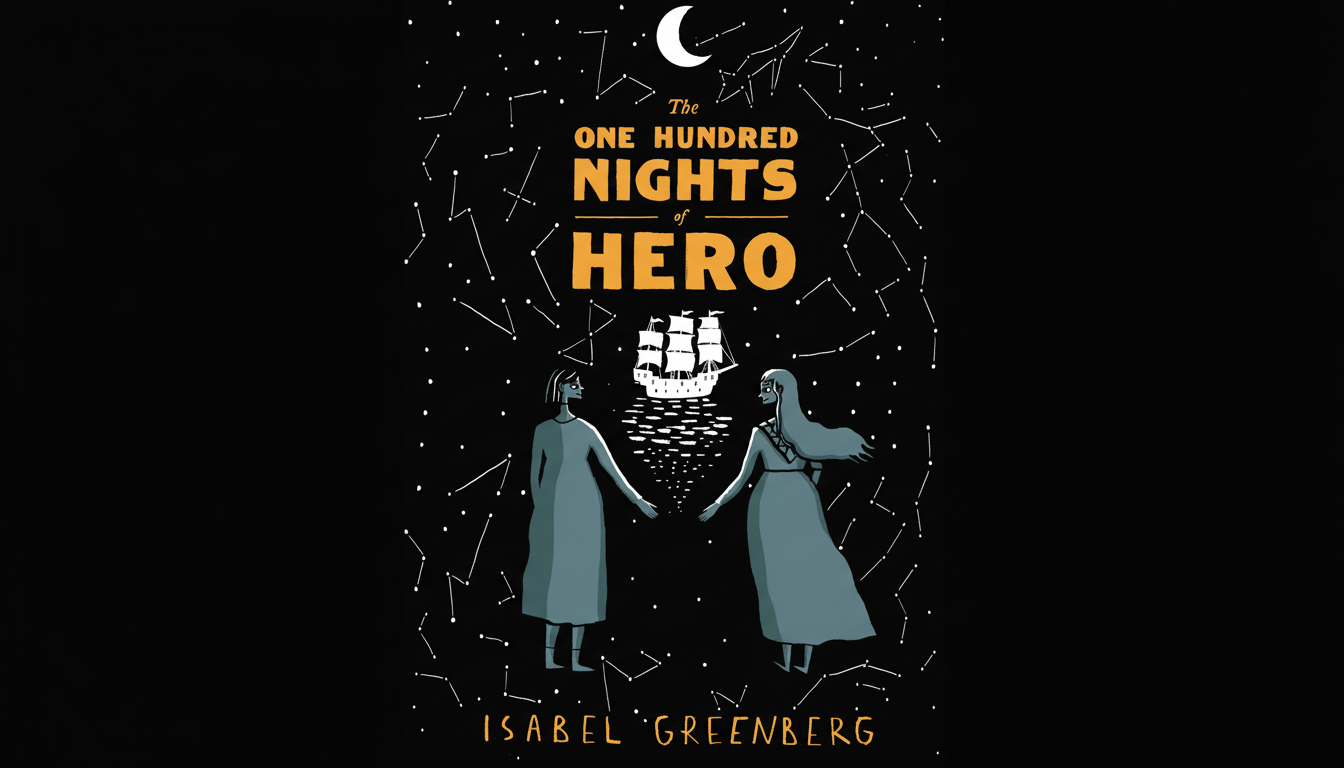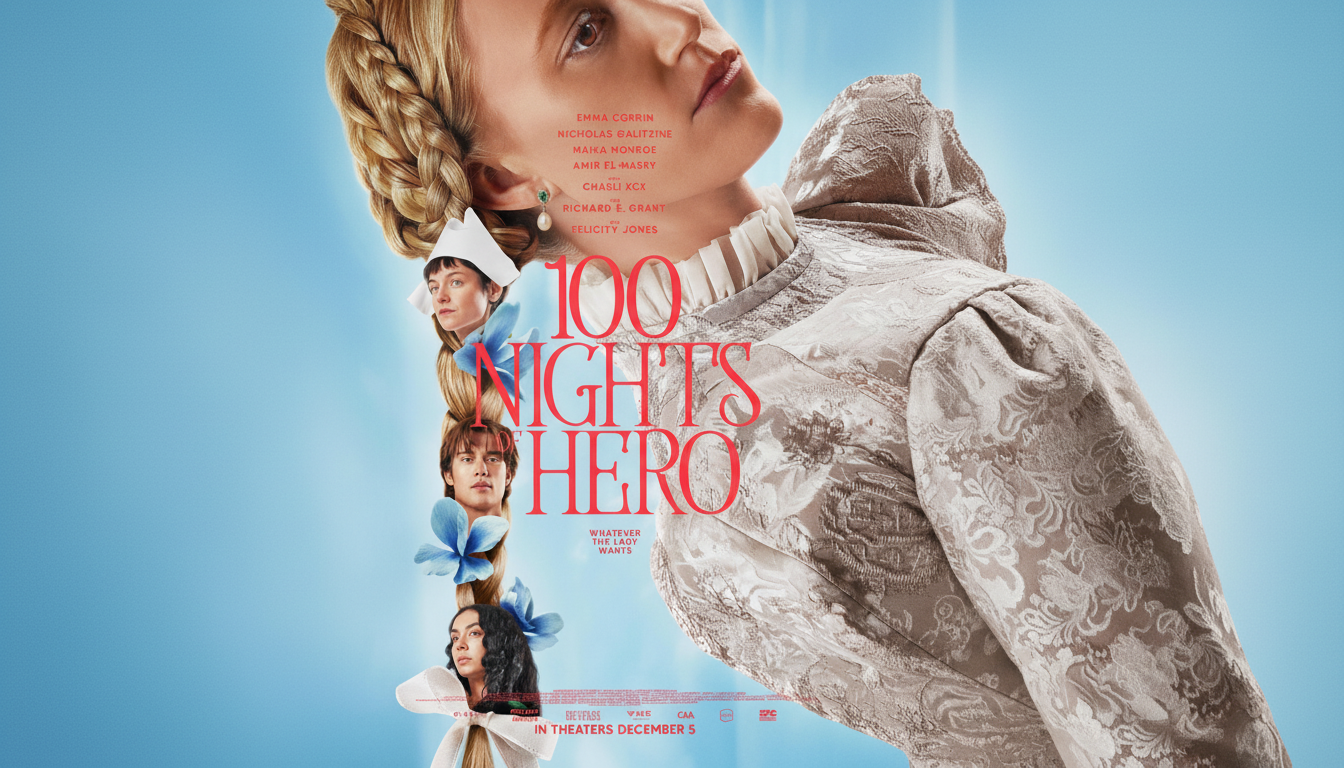Julia Jackman’s “100 Nights of Hero” is a glittering provocation and a soapy romance, a fairy tale that dares to pierce patriarchy with arch humor, and air pumped full of wit and color and unwavering determination.
Based on Isabel Greenberg’s idiomatic graphic novel, the film transforms a Scheherazade-style storytelling duel into an ode to queer love and female agency — wrapped in stagebound spectacle with sly contemporary bite.

A Myth Rewired for the Present, Politics and Power
Featuring a narrow-focus perspective that works initially, though becomes somewhat limiting in the final summaries, this coming-of-age story unfolds within an empire just quasi-medieval enough for laws about the bodies of women to seem both antiquated and chillingly relatable. At its center is Cherry (Maika Monroe), whose status and survival depend on a man-made clock; Hero (Emma Corrin), her quick-witted confidante, for whom the gift of storytelling is also something of a shield. Their guarded, tender, defiantly intimate bond is the engine of the film. For as the Beak Brothers, a corrupt masked order of zealots, literally codify obedience into doctrine, Jackman skewers the theater of male authority by making it actual theater: processions, pageants and rituals staged with satiric exactitude.
The politics are not footnotes but plot, and they reverberate far beyond the palace walls. GLAAD’s Studio Responsibility Index has found time and again that LGBTQ characters are underrepresented across major studio slates — usually in less than one-third of releases; the USC Annenberg Inclusion Initiative reported women helmed just 12% of top-grossing films in 2023. Amid all that background, 100 Nights of Hero isn’t merely a sublime text; it’s a pointed counter-narrative.
Performances That Spark with Chemistry and Clarity
Corrin is sensational as Hero, the stage manager whose eyes cut through any bull with surgical calm. Each time Hero launches into another story — her get-out-of-peril card for Cherry — it feels like the film exhales, opening up the canvas and excavating deeper emotional stakes. Monroe provides Cherry with a stillness so exquisite it breaks open in the silence of private moments: The gap between her ceremonial poise and her underground yearning is where the film’s heartbeat most clearly makes itself heard.
Nicholas Galitzine plays Manfred with charismatic menace, all swagger and soft-focus danger — the sort of lordling who makes a weapon of romance for performance art. Felicity Jones’s voice-over gives the fable a classic hush, and Charli XCX (making a cameo as one of Hero’s three sisters in one of her nested stories) peppers its fantasy with pop iconoclasm. The cast is uniformly sharp, but it’s the chemistry between Corrin and Monroe that provides the film its afterglow.

Design as Argument: Visual Worlds That Persuade
Cinematographer Xenia Patricia orchestrates the world as a gallery of dioramas: symmetrical frames, starbursts of light and saturated colors that let each passageway play like a stage. The result is fable-realism — never naturalistic, always emotionally exact. Oliver Coates’s mystical score flits between lullaby and warning, calling us to lean in close even as the film sharpens its knives.
The theater craft team deserves a golden curtain call. Production designer Sofia Sacomani, art director Naomi Bailey, set decorator Tatyana Jinto Rutherston and visual effects supervisor Paul Rice conjure a stained glass empire of commandments and bird-headed armor, a world where power is ridiculous by design. Susie Coulthard’s costumes, meanwhile, offer both satire and seduction: the Beak Brothers in cardinal reds and ossified masks; Manfred in louche billows; Hero with a sharp-angled maid’s uniform that seems at once utilitarian and mythic; Cherry in sculptural gowns designed to broadcast gilded captivity. The editing, by Amélie Labrèche and Oona Flaherty, helps keep the nested narratives airy and legible as they weave in between realities with barely a hitch.
Dare: The Nested Tale That Rewrites Survival
Jackman nods to the old magic of stories that keep violence at bay — think The Arabian Nights — but revises the spell. The in-film tale of three raven-haired sisters that Hero tells with a wicked twinkle is more than a dodge; it’s a manifesto on survival by committee. Each time the story is returned to, it refracts the main plot with fresh intention, emphasizing how storytelling can rewire consent, desire and destiny. It’s smart genre play — the fable within the fable teaches the audience how to read the outer one.
Why It Resonates Beyond Spectacle and Style
For all its candy-colored splendor, the movie never mistakes aesthetics for an argument. The spectacle is the argument. When womanhood becomes a regime of pageantry — fertility as policy, virtue as performance art — Jackman responds with a better show, one in which queer love and female intellect cause the curtain to fall and the laws to be rewritten. It’s a comfortable viewing experience that doubles as criticism, which is less common than it ought to be.
100 Nights of Hero deserves its place among the best screen fables of the year: kaleidoscopic, unruly and emotionally grounded in a storytelling schema that regards desire as compass and patriarchy as performance to be disrupted. Come for the luscious world-building; stay for a winking boldness of a story that, like its characters’ multiple knives and brushes with death, acknowledges imagination not as an escape hatch but as a weapon.

